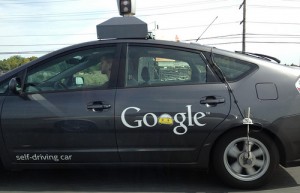
This past August, the online magazine TechCrunch had a salacious headline for tech geeks and robotics fans: Google plans to sell 2,500 driverless cars to Uber, a company similar to a taxi-service that connects cars with passengers.
The story seemed like tech and auto industry gold, as Google has been instrumental in developing self-driven cars and has a significant financial stake in Uber.
While many bloggers and reporters picked up on the story as a watershed mark in the development of driverless cars, there was a small hitch: The story was dated ten years in the future.
“People are dense, I guess,” TechCrunch author Ryan Lawler explained to the Poynter journalism training center about the mix-up.
But the possibility of driverless cars hitting the market sooner rather than later got us at Online Auto Insurance thinking, “Who will insure those cars once they hit the road?”
The short answer, according to the Insurance Information Institute’s Michael Barry, is that it’s “too early to tell.”
“There is no loss history on these vehicles,” Barry explained. “Since there is no loss history on the vehicles, the insurance ramifications are unknown.”
And because those ramifications are unknown, so far, none of the major personal auto insurers are offering coverage. But as more self-driven cars hit the road, that is expected to change.
Some think that personal auto insurers won’t bear the liability of most accidents with self-driving cars. Instead, that burden would be on the manufacturers.
“Cars are pretty straight forward,” according to University of Washington robotics law professor Ryan Calo. “Their job is to get passengers from point A to point B, and if they don’t, the manufacturer would be liable in most instances.”
Alain Kornhauser, the Transportation Program director at Princeton University, told A.M. Best TV that manufacturers might not have a problem taking on that liability if self-driving cars are as popular as they have the potential to be.
If the manufacturers are held liable for the damages, chances are that their product liability insurance would balloon. But if the demand for self-driving cars is high enough, they could just raise the price of the car to compensate, and consumers would essentially be making a trade-off for higher car prices in exchange for slashed personal car insurance rates.
But that raises another interesting question: If manufacturers are liable for damages — the same way that an appliance company can be responsible if it manufactured a faulty microwave that exploded — will the owners have to carry auto insurance?
Almost every state in the country requires some form of auto insurance, but if the motorist is not responsible for accidents or damage caused by the self-driven cars, why should they have to?
Right now, that’s a question some of the smartest insurance minds can’t answer. But these cars most likely will be driving hybrids, allowing for human or robotic control depending on the preferences of the user.
Barry at the III said in those cases, he expects personal auto insurance to become more common as more self-driven cars enter the roads.
“If a market develops,” Barry said, “I’m confident that a lot of auto insurers that write privately today will get into the driverless markets.”
But besides liability concerns, and the lack of state regulations for self-driven vehicles in most states, Barry said there’s another key factor insurance companies will have to consider before offering coverage.
“What’s it going to cost to repair these things?” Barry said with a laugh. “I’m sure it’s very high tech. I’m not sure … how much all that’s going to cost.”
Like a true insurance industry mind, Barry joked about the potential liabilities of this new technology.
“I mean, yeah they can drive themselves … But do they all have airbags?”
Currently, self-driven cars are allowed to be driven in Nevada if the manufacturer puts up a bond of between $1million and $3 million with the state’s DMV. Essentially, the bond acts as a type of self-insurance to allow companies like Google the opportunity to test their self-driven cars on the Silver State’s open highways.
In this model, the manufacturer is ultimately responsible for any damage their car may cause in an auto accident.
While a handful of other states, including California, allow for self-driven cars to be tested on the roadways, Nevada is currently leading the country in regulations for the autonomous automobiles. The state DMV there has created the infrastructure to fully test and drive these vehicles on the state’s roads, and has created some benefits for riders in the self-driven cars.
For example, passengers can text and talk on the phone; however, if they are drunk or otherwise impaired, they can’t drive the car.
Even Gov. Brian Sandoval has taken a hands-free spin in a self-driven car, calling the experience “amazing” and a testament to “American engineering.”
The developments in Nevada and other states has led to significant technological advancements, according to Calo.
“The technology exists already,” Calo said of self-driven cars’ availability to hit the market. “There are some limitations, though.”
Calo noted that if a self-driven car arrives at an intersection, and the stop light is out, the car will currently not know what to do. “The car can’t follow the command of a police officer that’s directing traffic,” Calo said.
(Photo credit: Zack Sheppard)